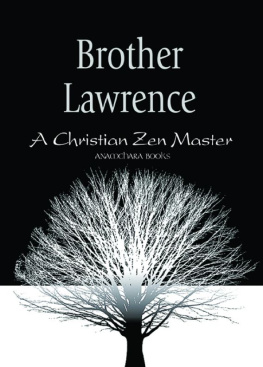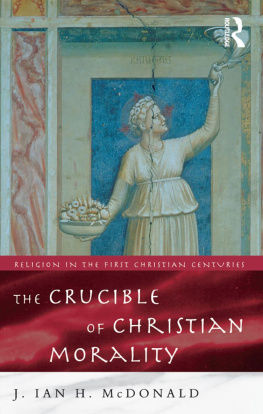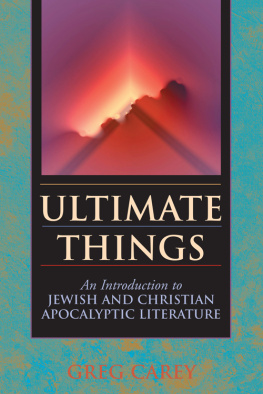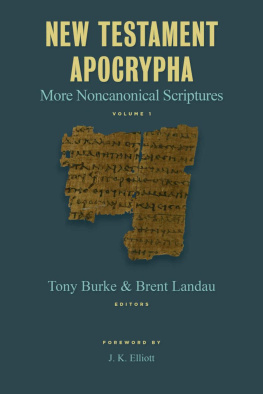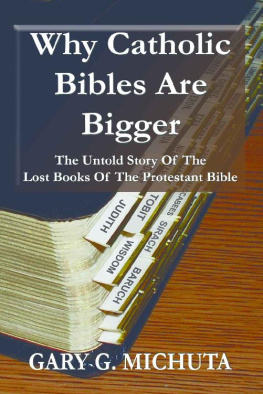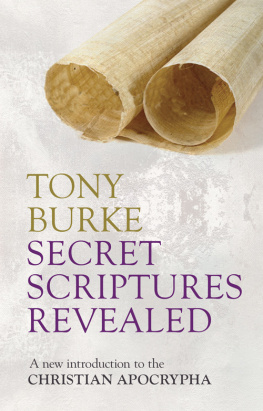Introduction to the Apocrypha
Introduction to the Apocrypha
Jewish Books in Christian Bibles
Lawrence M. Wills

Published with assistance from the foundation established in memory of Henry Weldon Barnes of the Class of 1882, Yale College.
Copyright 2021 by Yale University.
All rights reserved.
This book may not be reproduced, in whole or in part, including illustrations, in any form (beyond that copying permitted by Sections 107 and 108 of the U.S. Copyright Law and except by reviewers for the public press), without written permission from the publishers.
Yale University Press books may be purchased in quantity for educational, business, or promotional use. For information, please e-mail (U.K. office).
Set in Bulmer type by Integrated Publishing Solutions, Grand Rapids, Michigan.
Printed in the United States of America.
Library of Congress Control Number: 2020946416
ISBN 978-0-300-24879-1 (paper : alk. paper)
A catalogue record for this book is available from the British Library.
This paper meets the requirements of ANSI/NISO Z39.48-1992 (Permanence of Paper).
10 9 8 7 6 5 4 3 2 1
Contents
Acknowledgments
WHEN I LOOK BACK ON THE PAST TWENTY years or so, I realize that the greatest influences on my studies of the Apocrypha and related literature arose from the sessions of the Wisdom and Apocalypticism group of the Society of Biblical Literature. I want to thank the other members of the Steering Committee, the composition of which, like the Apocrypha, has changed over the years. Their combination of creativity and high scholarly standards has been an inspiration. Another important influence has been my coeditor of the Jewish Annotated Apocrypha, Jonathan Klawans. I express my gratitude as well to the contributors to that volume. The Jewish Annotated Apocrypha exceeded the hopes of the two coeditors, in that the contributors managed to say something new about the texts on every page. I have many fond memories of teaching at Episcopal Divinity School in Cambridge, Massachusetts, and since then have felt welcomed and supported as the Croghan Bicentennial visiting professor at Williams College and visiting professor in the Program in Judaic Studies and Department of Religious Studies at Brown University. The collegiality that I experienced with faculty, staff, and students in each of those institutions will remain with me. Other scholars have influenced me as well on the issues of the Apocrypha, and I thank them: Joan Branham, John Collins, Sidnie White Crawford, Nathaniel DesRosiers, Angela Kim Harkins, Richard Horsley, Mary Joan Leith, Gregory Mobley, George Nickelsburg, Saul Olyan, Christine Thomas, Annewies van den Hoek, Benjamin Wright, and Gale Yee. Two scholars passed from our field far too early and are truly missed: Ellen Aitken and Daniel Harrington. I recall all of our time together with warmth and gratitude. Heather Gold, Jessie Dolch, and Joyce Ippolito of Yale University Press along with the outside reviewers and others on the editorial staff have been a joy to work with, and this book has been greatly improved as a result of their involvement. Finally, my family has been a constant support and has recognized the value in studying ancient texts: Shelley, Jessica, Daniel, Heloisa, and Emma.
Note on Abbreviations
IN THE TEXT AND NOTES THE ABBREVIATIONS for journal titles, series, and primary sources are found in The SBL Handbook of Style (2nd ed.; Atlanta: SBL, 2014). All other journal titles and series names are provided in full. Translations of passages from the books of the Western Apocrypha are from the NRSV unless otherwise stated. Translations from other works are noted.
Introduction to the Apocrypha
Introduction
THE GREEK TERM APOCRYPHA LITERALLY meant things hidden and often carried a negative connotation. In the West, Apocrypha has referred to those texts that were included in the Christian Old Testaments but were not part of the Jewish Bible and were as a result not included in the Protestant Old Testaments. Yet the inclusion of these texts in the Bible was unsettled and even hotly debated for the entire history of Christianity, and ambiguity about both the term Apocrypha and the texts to be included in this category has never disappeared. In the sixteenth century, when Protestants removed these texts from their Old Testament, they sometimes took up the term Apocrypha to fuel polemics against alleged Catholic error. How then do we refer to these texts? Should we avoid the embattled term and use instead the official one coined in the Catholic and some other churches, deuterocanonical texts, meaning second canon? Deuterocanonical, however, was not a term used in the earliest Christian churches, introduced only in 1566 by the Catholic theologian Sixtus of Siena in response to Protestant challenges. And today, since the term Apocrypha is generally used in a neutral way, avoiding it does not seem so pressing. Even Catholic books on the topic use it; the Catholic scholar Daniel Harrington chose Apocrypha for the title of his book on these texts and used deuterocanonical only sparingly.The term Old Testament, in fact, Palaia Diathk, should perhaps be translated Ancient and Venerable Covenant. In this book I use the term Old Testament to describe the first part of the Christian Bibles, with no judgment as to its relation to the New Testament. I make these observations as a historian, not as a theologian.
Standing behind our discussion is the observation that canon and apocrypha are ambiguous terms, much more so than most students or even scholars realize. There has been a move in biblical studies away from the traditional canonical views of ancient Jewish and Christian texts. Canons arose slowly and were not as fixed as later believers assumed. I am fully in agreement with this trend to challenge the notion of canons, and I see this book as an extension of that trend. I treat interesting Jewish texts that were included in various Christian Bibles, but this book is also a discussion about canon. In speaking of Apocrypha, the varied, conflicted, and culturally defined nature of the category becomes a critical topic. This book is therefore a meta-canonical discussion of the Jewish texts that have been added to and subtracted from Christian Bibles. Apocrypha is therefore in some ways an artificial grouping of Jewish texts. In the ancient period, these texts were spread throughout the other Old Testament texts, and there was no sense that they belonged together until they were discussed as problem texts. Of course, one could simply treat them as a second tier of the Old Testament. The Apocrypha have indeed often been seen as less worthy, a sort of Bible Lite. Even Harrington, a highly regarded Catholic scholar and priest, could say, The wider canon was accepted. But the additional books made little doctrinal or practical difference. For this introduction, however, it is assumed that the Apocrypha are important historically and theologically and are compelling and entertaining both as individual texts and as part of an evolving canon.
The texts of the Apocrypha indeed have double or even multiple identities, in that they were Jewish texts preserved in Christian Bibles. This is a significant pointhence the subtitle of this book. The authors were Jewish, as were the first audiences. However, although some of the individual texts were known to later Jews, there is no evidence that they were well preserved by Jews or ever considered a part of the Jewish canon. The texts were most often interpreted by Christian scholars and authors as part of the Old Testament, and often in relation to the New Testament and later Christian tradition. Readers and scholars alike have brought Christian theological beliefs to them and have asked Christian questions of them. More secular historians have studied the texts of the Apocrypha in the context of ancient Jewish literature in general, but there has also been a growing sense among some scholars that the texts could be analyzed with an eye toward how they relate to Jewish, not Christian tradition. An attempt to accomplish this is now also found in the
Next page

